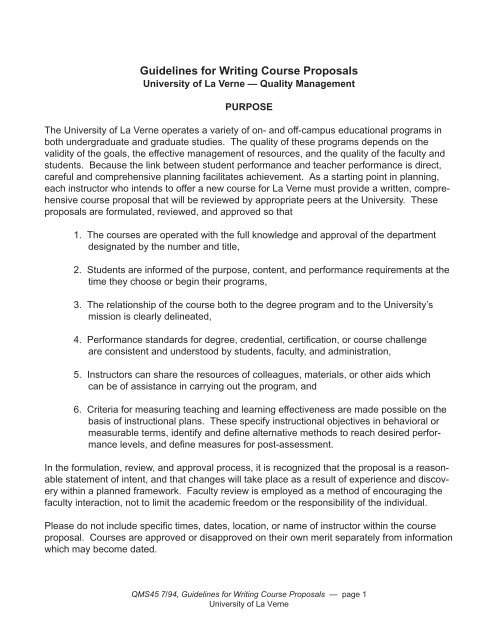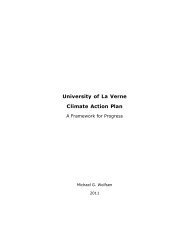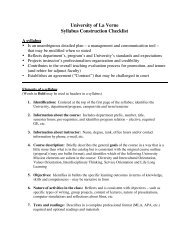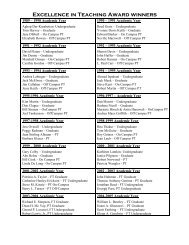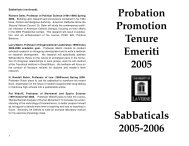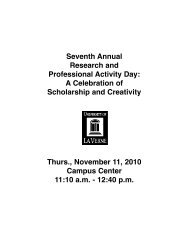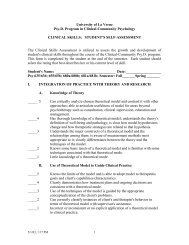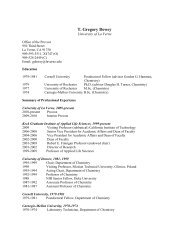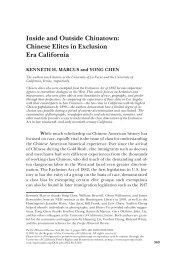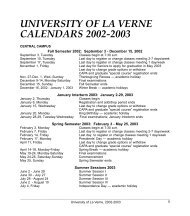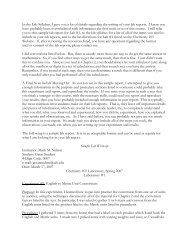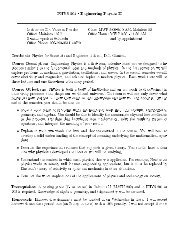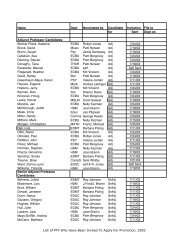Guidelines for Writing Course Proposals - University of La Verne
Guidelines for Writing Course Proposals - University of La Verne
Guidelines for Writing Course Proposals - University of La Verne
You also want an ePaper? Increase the reach of your titles
YUMPU automatically turns print PDFs into web optimized ePapers that Google loves.
<strong>Guidelines</strong> <strong>for</strong> <strong>Writing</strong> <strong>Course</strong> <strong>Proposals</strong><br />
<strong>University</strong> <strong>of</strong> <strong>La</strong> <strong>Verne</strong> — Quality Management<br />
PURPOSE<br />
The <strong>University</strong> <strong>of</strong> <strong>La</strong> <strong>Verne</strong> operates a variety <strong>of</strong> on- and <strong>of</strong>f-campus educational programs in<br />
both undergraduate and graduate studies. The quality <strong>of</strong> these programs depends on the<br />
validity <strong>of</strong> the goals, the effective management <strong>of</strong> resources, and the quality <strong>of</strong> the faculty and<br />
students. Because the link between student per<strong>for</strong>mance and teacher per<strong>for</strong>mance is direct,<br />
careful and comprehensive planning facilitates achievement. As a starting point in planning,<br />
each instructor who intends to <strong>of</strong>fer a new course <strong>for</strong> <strong>La</strong> <strong>Verne</strong> must provide a written, comprehensive<br />
course proposal that will be reviewed by appropriate peers at the <strong>University</strong>. These<br />
proposals are <strong>for</strong>mulated, reviewed, and approved so that<br />
1. The courses are operated with the full knowledge and approval <strong>of</strong> the department<br />
designated by the number and title,<br />
2. Students are in<strong>for</strong>med <strong>of</strong> the purpose, content, and per<strong>for</strong>mance requirements at the<br />
time they choose or begin their programs,<br />
3. The relationship <strong>of</strong> the course both to the degree program and to the <strong>University</strong>’s<br />
mission is clearly delineated,<br />
4. Per<strong>for</strong>mance standards <strong>for</strong> degree, credential, certification, or course challenge<br />
are consistent and understood by students, faculty, and administration,<br />
5. Instructors can share the resources <strong>of</strong> colleagues, materials, or other aids which<br />
can be <strong>of</strong> assistance in carrying out the program, and<br />
6. Criteria <strong>for</strong> measuring teaching and learning effectiveness are made possible on the<br />
basis <strong>of</strong> instructional plans. These specify instructional objectives in behavioral or<br />
measurable terms, identify and define alternative methods to reach desired per<strong>for</strong>mance<br />
levels, and define measures <strong>for</strong> post-assessment.<br />
In the <strong>for</strong>mulation, review, and approval process, it is recognized that the proposal is a reasonable<br />
statement <strong>of</strong> intent, and that changes will take place as a result <strong>of</strong> experience and discovery<br />
within a planned framework. Faculty review is employed as a method <strong>of</strong> encouraging the<br />
faculty interaction, not to limit the academic freedom or the responsibility <strong>of</strong> the individual.<br />
Please do not include specific times, dates, location, or name <strong>of</strong> instructor within the course<br />
proposal. <strong>Course</strong>s are approved or disapproved on their own merit separately from in<strong>for</strong>mation<br />
which may become dated.<br />
QMS45 7/94, <strong>Guidelines</strong> <strong>for</strong> <strong>Writing</strong> <strong>Course</strong> <strong>Proposals</strong> — page 1<br />
<strong>University</strong> <strong>of</strong> <strong>La</strong> <strong>Verne</strong>
COMPONENTS OF A COURSE PROPOSAL<br />
The following outline provides an explanation <strong>of</strong> the steps <strong>for</strong> preparing a course proposal<br />
along with a hypothetical model as an example. You will note that the component parts have a<br />
congruent relationship to one another. The course goals, by giving direction and purpose, find<br />
expression in the activities <strong>of</strong> participants and manifest themselves in some specific resultant<br />
behavior (objectives). This interrelationship provides a road map, so to speak, <strong>for</strong> clarity <strong>of</strong> purpose<br />
and per<strong>for</strong>mance expectations.<br />
1. <strong>Course</strong> Designation, Authorship, and Date<br />
a. Department (and proposed course number, if appropriate)<br />
b. Title — a brief statement defining a subject as a particular area, or a related group <strong>of</strong><br />
ideas. Please make the title as descriptive and as brief as possible, remembering that it<br />
will be abbreviated to 22 characters (including spaces) on transcripts.<br />
c. Semester-hour value — the time required to complete the instructional plan. One<br />
semester hour is equivalent to 15 hours <strong>of</strong> instruction.<br />
d. Intended level or course — undergraduate, graduate, doctoral, pr<strong>of</strong>essional credit, etc.<br />
e. Proposed cross listings, if any<br />
f. Name <strong>of</strong> the author <strong>of</strong> the proposal<br />
g. Date the proposal was prepared<br />
Example:<br />
PSY 517, Counseling Theories and Techniques (3)<br />
Graduate Credit only<br />
Prepared by Leo Freud, September 4, 1992<br />
2. <strong>Course</strong> Description<br />
A brief narrative paragraph establishing the scope <strong>of</strong> the course in summary <strong>for</strong>m. Goals,<br />
activities, and requirements may be included to help clarify the scope <strong>of</strong> the course. This<br />
paragraph serves as an identifying reference in course catalogs. ULV’s catalog description<br />
will be abstracted from this statement.<br />
Example:<br />
Explores the development <strong>of</strong> counseling as a pr<strong>of</strong>ession. Reviews theory, technique, attitude,<br />
and counselor role. Students gain practice in theory application in a practical workshop<br />
setting.<br />
3. Goals<br />
A statement, or list <strong>of</strong> statements, indicating broad direction(s) <strong>of</strong> purpose. A goal is a general<br />
in nature. Goals are typically worded in phrases such as “to develop an understanding,”<br />
“to become cognizant <strong>of</strong> or familiar with,” “to be able to use and interpret,” “to improve<br />
understanding,” “to gain experience in,” or “to be able to critically analyze,” etc.<br />
QMS45 7/94, <strong>Guidelines</strong> <strong>for</strong> <strong>Writing</strong> <strong>Course</strong> <strong>Proposals</strong> — page 2<br />
<strong>University</strong> <strong>of</strong> <strong>La</strong> <strong>Verne</strong>
Although goals stated in such general terms cannot serve as criteria in evaluating attainment,<br />
they provide an identification <strong>of</strong> purpose that indicates to the student what he can<br />
expect from the course.<br />
Example:<br />
a. Participant will describe various counseling theories and the techniques used in each<br />
4. <strong>Course</strong> Contents<br />
An outline <strong>of</strong> the components <strong>of</strong> the course, identifying the major areas covered by the course.<br />
Example:<br />
a. Development <strong>of</strong> the various schools <strong>of</strong> counseling theories and techniques—individual<br />
and group—which include the following:<br />
1). Supportive Therapy<br />
2). Behavior Therapy<br />
3). Analytical Therapy<br />
4). Transactional Therapy<br />
5). Psychoanalysis<br />
5. Activities <strong>of</strong> Participants<br />
A list <strong>of</strong> activities planned <strong>for</strong> course meetings. They must include details on library work,<br />
writing assignments, and computer exercises and activities. What will the participants do<br />
during the course meetings? What is the expected time frame <strong>of</strong> the course? These activities<br />
should clearly illustrate the goals and outline <strong>of</strong> the course.<br />
Example:<br />
The student will do the following:<br />
a. Listen to presentations <strong>of</strong> pr<strong>of</strong>essor and visiting authorities<br />
b. View films<br />
c. Participate actively in topic discussion with leader and peers<br />
d. Read and write seven reviews <strong>of</strong> relevant books and articles obtained through library<br />
research<br />
e. Give class presentations<br />
f. Participate in computer-simulated counseling sessions using various model techniques.<br />
6. Evidence <strong>of</strong> learning Outcomes<br />
What is the intended evidence <strong>of</strong> learning outcome? What do you expect to happen<br />
because <strong>of</strong> this course? What are the expected and the specific actions that will demonstrate<br />
the learning <strong>of</strong> a skill, attitude, or body <strong>of</strong> knowledge? These should not be confused<br />
with goal statements. Objectives are more specific and measurable. In the event that<br />
someone would want to challenge this course, these could be used to create an appropriate<br />
challenge exam, if this course is challengeable. If it is believed that this course cannot be<br />
challenged, please state why.<br />
QMS45 7/94, <strong>Guidelines</strong> <strong>for</strong> <strong>Writing</strong> <strong>Course</strong> <strong>Proposals</strong> — page 3<br />
<strong>University</strong> <strong>of</strong> <strong>La</strong> <strong>Verne</strong>
Example:<br />
By the end <strong>of</strong> the course, the student will have<br />
a. Described in writing the theoretical aspects <strong>of</strong> the counseling approaches discussed<br />
in class and observed in presentations<br />
b. Demonstrated and described, orally and in writing, the identification and classification <strong>of</strong><br />
pertinent client behavior<br />
c. Demonstrated in class and in writing, diagnostic and observational skills <strong>of</strong> emotional<br />
disorders, etc.<br />
7. Assessment Plan<br />
The assessment plan should clearly state the means <strong>of</strong> measuring course results. Please<br />
list the examinations, papers, demonstrations, projects, or other means you plan to use and<br />
state how they will certify achievement.<br />
This assessment plan should be based upon the learning outcomes (objectives). If the<br />
objectives have been clearly and specifically stated, the assessment plan has practically<br />
been designed.<br />
8. Text, Materials, and Resources<br />
List all written, audio-visual, electronic, and other materials to be used in the class. If there<br />
are any materials crucial to the course but unavailable on the general market (such as<br />
something you have written or prepared), please attach copies to the proposal.<br />
Example:<br />
a. Required and supplementary texts<br />
b. A list <strong>of</strong> resources used in class sessions: books, articles, journals, films, videos, tapes,<br />
and other supplemental materials<br />
c. A list <strong>of</strong> resources used in homework assignments: books, articles, s<strong>of</strong>tware programs,<br />
journals, data sources, and other materials<br />
9. Program Relationship<br />
Please explain how the proposed course relates to each <strong>of</strong> the following:<br />
a. ULV’s General Education Requirements (undergraduate courses only)<br />
b. Any major, minor, or other program (including certificate and credential programs)<br />
c. ULV’s Mission Statement (see the current ULV Catalog), especially with respect to the<br />
following:<br />
1). Values<br />
2). Diversity and intercultural orientation<br />
3). International orientation<br />
4). Lifelong learning<br />
5). Service<br />
Thank you <strong>for</strong> the time and ef<strong>for</strong>t you have put into preparing this proposal.<br />
QMS45 7/94, <strong>Guidelines</strong> <strong>for</strong> <strong>Writing</strong> <strong>Course</strong> <strong>Proposals</strong> — page 4<br />
<strong>University</strong> <strong>of</strong> <strong>La</strong> <strong>Verne</strong>


